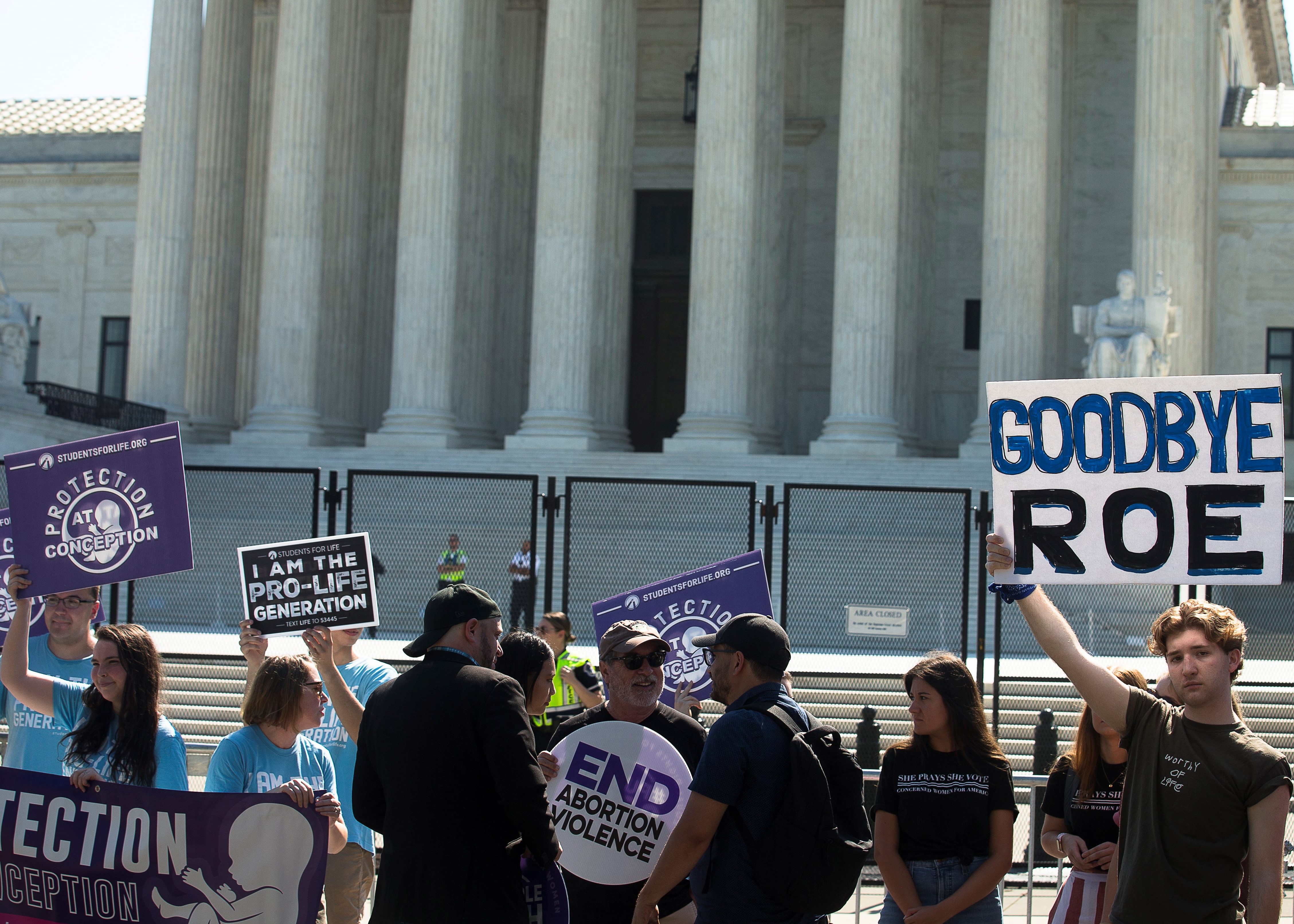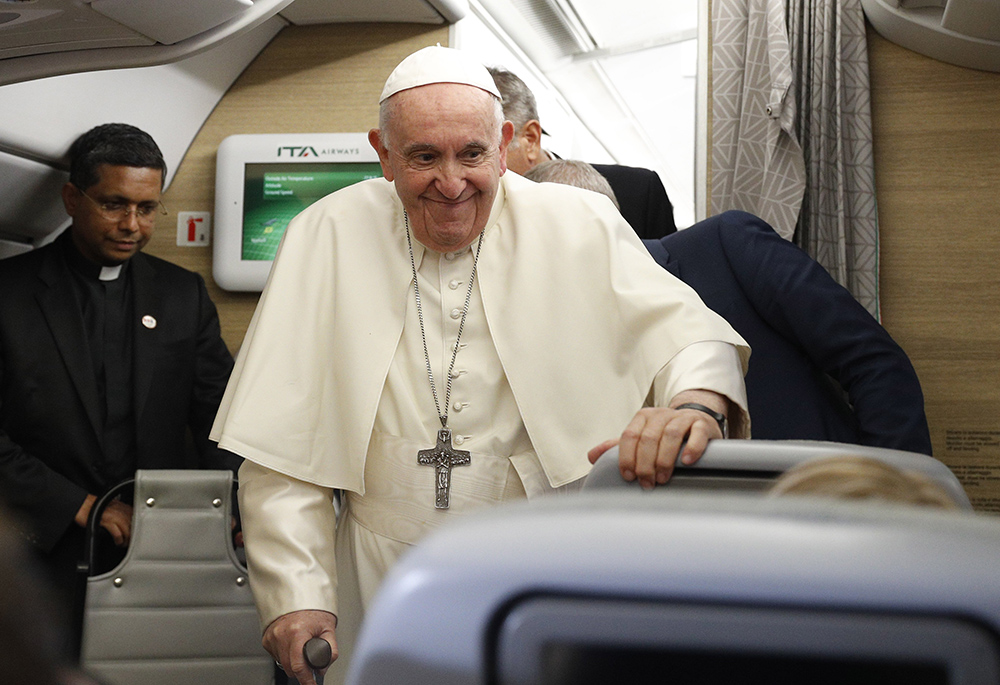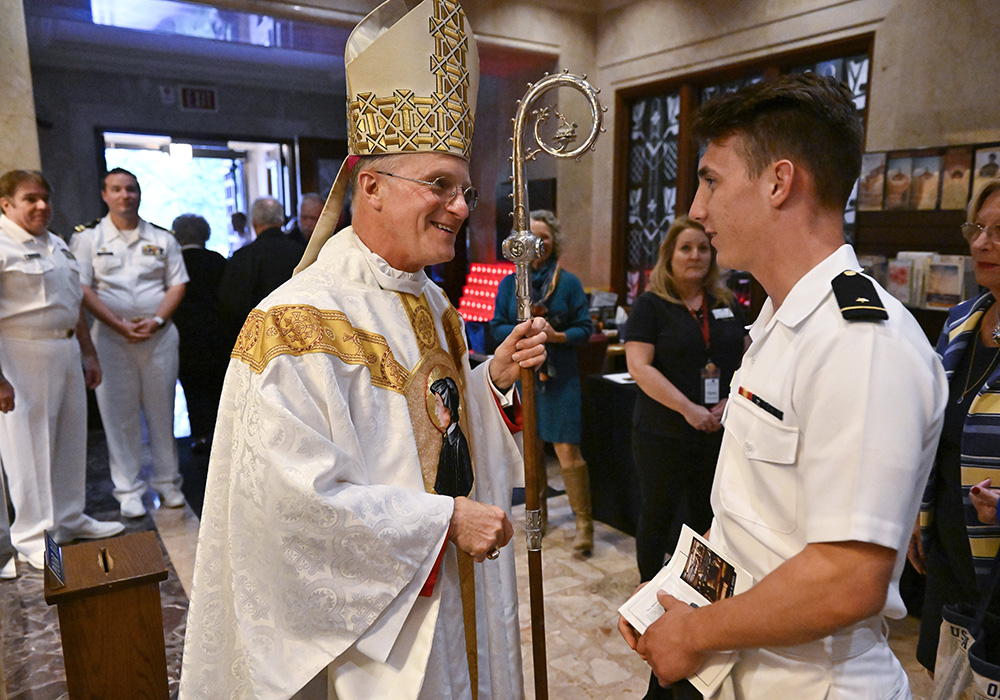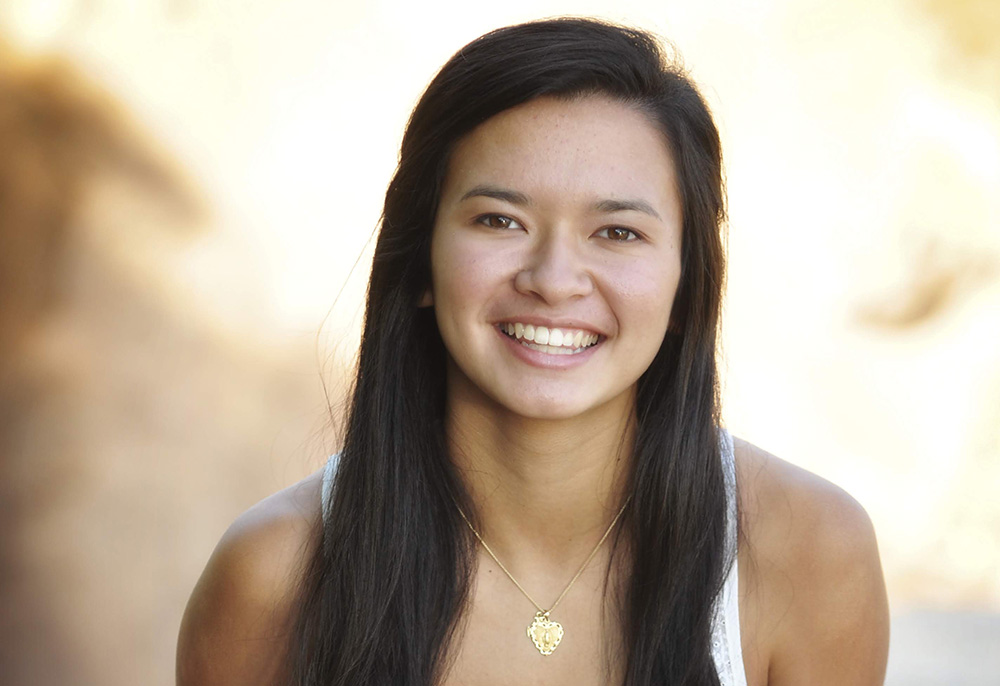
Pro-life demonstrators are seen near the U.S. Supreme Court in Washington June 15, 2022. The Supreme Court June 24 released an opinion that overturns Roe v. Wade after nearly 50 years. (CNS/Tyler Orsburn)
The changing face of the U.S. bishops' conference, Pope Francis' continued implementation of the Second Vatican Council, and reaction to the Supreme Court's decision to overturn the constitutional right to choose an abortion are just some of the topics that NCR's opinion, commentary and editorial writers addressed in 2022.
These 10 pieces were NCR's most read — not necessarily the most important — opinion articles and commentaries of the year. They are listed in order by the number of site visitors who read the story, with short summaries of their contents. We posted a separate article about our most read news stories earlier this week.
1. Francis' choice of new Cardinal McElroy an unmistakable sign for US church
The news that San Diego Bishop Robert McElroy was named a cardinal was "thrilling" for NCR columnist Michael Sean Winters, who pointed out that McElroy is the first American to be named a cardinal who was not already an archbishop or a top Vatican official.
Winters outlined NCR's long association with McElroy, starting in 2010 when then editor-at-large Tom Roberts ran the first national profile of McElroy when he was named an auxiliary bishop of his home city, San Francisco. McElroy has also written for NCR many times, including what remains "the best article on synodality from a U.S. bishop to be published to date," Winters said.
"Cardinal-designate McElroy has long been seen as the intellectual leader of those bishops most closely aligned with Francis, and the pope has confirmed that assessment," Winters wrote.
2. Pope Francis was not fully briefed prior to Canadian visit

Pope Francis arrives to answer questions from journalists aboard his flight from Iqaluit, in the Canadian territory of Nunavut, to Rome July 29, 2022. (CNS/Paul Haring)
"Pope Francis' six-day pastoral visit to Canada was a great success," said Jesuit Fr. Thomas Reese in a commentary. "It wasn't until the news conference on the plane back to Rome that it became clear he wasn't properly briefed for his visit."
Reese outlines a couple of questions asked by reporters to which Francis did not have clear responses. One question, asked by an Indigenous reporter, looked for Francis' thoughts on the Doctrine of Discovery. The pope responded by asking the reporter to explain what the Doctrine of Discovery is.
"What? The pope does not know what the Doctrine of Discovery is? There isn't an excuse for this lapse," Reese wrote. "How could the pope make a trip to Canada to apologize for the church's role in forced assimilation without knowing about the Doctrine of Discovery? Why was he not briefed on this?"
All of our coverage of Francis' trip to Canada can be found here.
3. Opposition to Pope Francis is rooted in a rejection of Vatican II
In a keynote address by Villanova University professor Massimo Faggioli, delivered at a conference for and with a group of U.S. bishops March 25-26, 2022, in Chicago, Faggioli spoke about the gap between the expectations of the Second Vatican Council and the situation of the Catholic Church today, especially in this country.
"We must acknowledge that we live in a time of interruption in the reception of Vatican II in the U.S. — and this crisis has been there for quite some time," Faggioli said. "We need to understand the present state of the reception of Vatican II, especially in the U.S., in order not to be trapped into narratives that posit a direction toward a pre-determined end."

Archbishop Timothy Broglio of the U.S. Archdiocese for the Military Services greets a U.S. Naval Academy cadet midshipman after the annual Sea Services Pilgrimage Mass at the National Shrine of St. Elizabeth Ann Seton Oct. 2, 2022, in Emmitsburg, Maryland. (CNS/Courtesy of Devine Partners/Jason Minick)
The U.S. bishops sent a clear message of rejection to the pope by selecting Archbishop Timothy Broglio, who heads the Archdiocese for the Military Services, as president of the U.S. Conference of Catholic Bishops, Winters said in a Nov. 15 column.
"The bishops' choice of new leadership revealed the deeper ecclesiological orientation of the body," Winters wrote. "They had to decide if they wanted to be a part of the ongoing reception of the Second Vatican Council in the context of the magisterium of Pope Francis, or not, a choice made all the more obvious by the success of the synodal process so far."
During a Jan. 12 speech about St. Joseph's fatherhood, Francis said that couples who choose pets over having children are "selfish." Pet owners and animal lovers in the English-speaking world, Catholic and otherwise, responded with anger and sarcasm in defense of their pets.

Flora x. Tang named her second foster kitty Iggy — after St. Ignatius of Loyola. (Courtesy of Flora x. Tang)
"For most, however, it was not just about the pets," wrote NCR contributor Flora x. Tang in response. "Rather, in a seemingly anti-pet statement, the Catholic Church's narrow view on reproduction and marriage is again reinforced by a pope who himself is outspoken about gender equality and LGBT inclusion. While church teaching on marriage theoretically leaves room for couples who are unable to conceive children, childbirth (and sometimes as an afterthought, adoption) is still upheld on a pedestal as the highest way for a Catholic marriage to be 'fruitful.' "
6. Editorial: In wake of Dobbs decision, it's time for anti-abortion Catholics to become truly pro-life
Many Catholics celebrated the U.S. Supreme Court's June 24 decision in Dobbs v. Jackson Women's Health Organization, which halted the nearly 50-year history of federally protected legal abortion in the United States.
"The Catholic Church's teaching about the beginning and the sanctity of human life is quite clear," we wrote in our editorial. "For those who hold to it, the court's decision may well be considered an enormous step forward in the protection of basic human rights for the preborn.
"Yet it is a decision with a very high cost — one perhaps too high for the country, and our church, to bear," we continued. "As we at NCR have long argued, making abortion illegal is not the only — or even necessarily the most effective — way to bring about a reduction in the number of abortions in this country."
Graffiti that supports abortion rights is seen on a wall at the grade school of the Church of the Ascension in Overland Park, Kansas, July 10, 2022. Kansas voters on Aug. 2 overwhelmingly rejected a ballot measure that would have allowed the Republican-controlled Legislature to tighten restrictions or ban the procedure outright. (CNS/Courtesy of The Leaven)
7. Church teaching on the dignity of women changed my mind about criminalizing abortion
NCR contributor David E. DeCosse wrote about his previous support for overturning Roe v. Wade, including voting for Ronald Reagan for president primarily because of his capacity to appoint justices to the U.S. Supreme Court who would vote against the constitutional right to choose an abortion.
But when the Supreme Court made the June 24 decision in Dobbs v. Jackson Women's Health Organization, DeCosse found himself with a different point of view.
"I have never doubted the right to life of the fetus," he wrote. "But two implications of the dignity of women have been especially formative in expanding my understanding of the range of values at stake in matters of law and abortion: women's full moral agency and their right to bodily integrity."
Joyce Calvo wrote a moving account of what happened to her daughter Alana, who took her own life in December 2019. Although the church officials deny engaging in "conversion therapy," it's clear from Alana's journals and what she told Calvo before she died that priests and other representatives of the church encouraged her to conceal and suppress her sexual orientation.

Alana Chen died by suicide in 2019. Although church officials deny engaging in "conversion therapy" with her, Alana's mother insists that priests and other representatives of the church encouraged her daughter to conceal and suppress her sexual orientation. (Photo courtesy of the family)
Calvo said that her goal for the essay was twofold.
"I hope it will alert Catholic parents to beware the devastating impact the church can have on their LGBTQ+ children," she wrote. "And I hope it will persuade people speaking for the church to abandon their misguided and dangerous attempts to alter what God has made."
9. I forgive Pope Benedict. I hope others can too.
Reese opened up about his firing as editor of America magazine after seven years, at the direction of then-Cardinal Joseph Ratzinger, who was prefect of the Congregation for the Doctrine of Faith and later became Pope Benedict XVI. As editor, Reese published various commentaries and articles about important issues facing the church, even if they differed from the Vatican's opinion.
"Within a couple of years, Ratzinger, through the Jesuit superior general in Rome, was signaling his unhappiness with the magazine," Reese wrote. "It became clear that in Rome's view a Catholic journal of opinion should only express one opinion — the Vatican's. Every document and word from the Vatican should be greeted with uncritical enthusiasm."
Advertisement
Although Reese was not surprised at being let go, he was still angry and depressed. "I am getting old, and I now want to forgive Benedict," he wrote. "I want to let it go. I don't think we really grow up until we are able to forgive our parents for their failures."
10. Pope Francis' reforms make the heresy-hunting Vatican of John Paul II barely recognizable
In a condensed version of an address Austen Ivereigh gave May 25 to the Union of Superiors General, the Rome-based umbrella group representing male Catholic religious orders across the world, Ivereigh spells out the implementation of Francis' new constitution for the Roman Curia, Praedicate Evangelium ("Preach the Gospel").
"The constitution consolidates and deepens the reform that Francis has been carrying out these past nine years," Ivereigh said. "It is a reform aimed at nothing less than a conversion of the way power is exercised in and from Rome, and by extension in the global Catholic Church."








